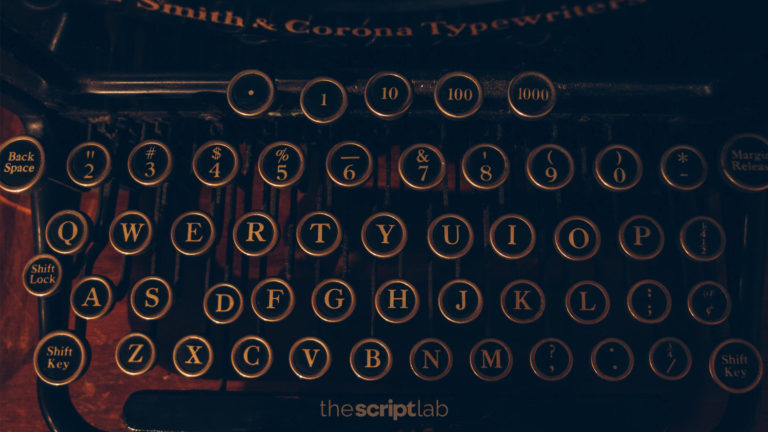Sign up for the
TSL Newsletter
and get $50 off Final Draft 12
By David Young · November 10, 2021

Whatever you do will always be informed by what you want or need. I was, for many years, devoted to becoming a marine biologist. I worked toward that goal, too: from choosing a dead tongue for my required foreign language credits to writing dissertations about societies dependent on certain types of fishing, I dedicated time and effort to the desire to be a researcher in that field.
For those of you reading who actively avoid the ocean, don’t worry, you can keep reading — I didn’t continue with that field, because I fell in love with screenwriting, and pursued that instead. However, my actions spoke to my motivation during that earlier pursuit.
There was a dangerous point in time, a point of uncertainty, right before I changed direction: dangerous because when you’re pursuing education, careers, or hobbies in a certain field, you need to head in that direction.
The same is true of your characters. Goals like becoming a ruler, getting revenge, or finding love are all motivations — and your characters will act on whichever motivations drive them. To have a character act without these motivations in place and confirmed is a treacherous path for any writer to take.
The protagonist’s own main goal, though, is the most dangerous thing of all to forget when writing your story.
A lot of the time, writers want to focus on certain events they want to have happen in their story — how they want the story to develop, and what interactions they want to take place. In doing so, you can sometimes lose sight of what’s important to the character themselves. If you’re too focused on the idea of a certain event, you may start to forget that the protagonist’s main goal should be the central focus of the story — and should be the driving force behind their actions. Even when deciding that it might be cool or fun to have a character act a certain way, you have to fact check: when you’ve got a good idea of how your character is meant to behave and the goals they have, you might find that this cool or fun idea doesn’t quite line up with that motivation.
On the other hand, people might forget the main goal of their protagonist because that character is meant to transform. But while your characters may have arcs and their general “wants” may change, their underlying need, the main goal for their actions and choices, should always stay in place. To be admired by their peers, to be recognized for their brilliance, or to have control over their destiny — all of these main motivations belong at the center of a narrative and the protagonist’s changes throughout a story, even if the way they try to reach these goals changes over time.

It can be hard to tell whether you’ve lost sight of a certain motivation for many reasons. Getting into storytelling mode can really give writers tunnel vision and there’s even a chance that some reinforced actions are more subtle and play out over time. But to make sure you’re on the right track and haven’t lost sight of your character’s main motivations, there are some places you can look:
How does your protagonist represent themselves to others? Through actions and dialogue alike, there’s a self-image they have — and that self-image, even if it’s biased, should be informed by those motivations. Remember, how people see themselves and how they want to see themselves are often far closer than we like to admit, so it’s an important part of any main character.
Ask yourself whether the narrative is headed toward that main goal. If your story is actually headed elsewhere, then there’s a big chance you’ve forgotten what your protagonist wants to achieve — you need to find a way to remind yourself. Every story event will act as part of a cause-and-effect chain that leads to that goal either succeeding or failing. By looking at that chain, you can learn whether your story’s staying true to the goal in question.
Your story is set in its own world. Whether that world is based on the real world or completely founded in fantasy, it should provide room for your character to explore and pursue their desires, and that goes especially for your protagonist. Whatever goal they actively pursue for the sake of the story, it should feel relevant to the world — and if it doesn’t, it will most likely raise the question: Did you mean to emphasize a different main goal for the world and for your character? If so, this is one way to suss out the issue.
Every over-planner and self-described control freak knows this universal truth: Having your goals in mind helps you to act accordingly. With your characters, you’ll always find that the same holds true. So, whether your protagonist is meant to rule the world, or they just want to make their parents proud, the story that revolves around them will systematically reveal that motivation through actions — and make your audience connect with them all the better.
—
 David Wayne Young is an independent film producer and screenwriter with years of experience in story analysis, even providing coverage for multiple international screenwriting competitions. David’s obsessions include weird fiction and cosmic horror, and he’s formally trained in the art of tasting and preparing gourmet coffee in various worldly traditions, from Turkish coffee to hand-tamped espresso — all enjoyed while writing, of course.
David Wayne Young is an independent film producer and screenwriter with years of experience in story analysis, even providing coverage for multiple international screenwriting competitions. David’s obsessions include weird fiction and cosmic horror, and he’s formally trained in the art of tasting and preparing gourmet coffee in various worldly traditions, from Turkish coffee to hand-tamped espresso — all enjoyed while writing, of course.